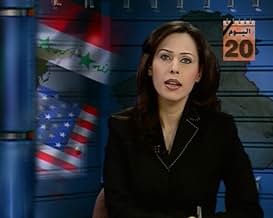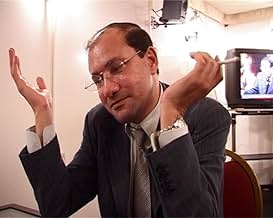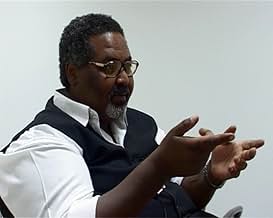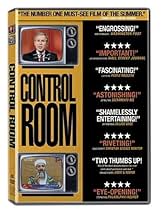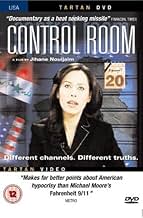VALUTAZIONE IMDb
7,6/10
5336
LA TUA VALUTAZIONE
La percezione della guerra degli Stati Uniti con l'Iraq, con un'enfasi sulla copertura di Al Jazeera.La percezione della guerra degli Stati Uniti con l'Iraq, con un'enfasi sulla copertura di Al Jazeera.La percezione della guerra degli Stati Uniti con l'Iraq, con un'enfasi sulla copertura di Al Jazeera.
- Premi
- 9 vittorie e 10 candidature totali
Josh Rushing
- Self
- (as Lt. Josh Rushing)
George W. Bush
- Self
- (filmato d'archivio)
Donald Rumsfeld
- Self
- (filmato d'archivio)
Recensioni in evidenza
Control Room is the latest film from the Egyptian-born Harvard-educated director of startup.com, Jehane Noujaim.
It follows the only independent news service in the Middle East, Al Jazeera, for six weeks, starting one week before the US invasion of Iraq in 2004.
The war's press coverage was delivered from US military Central Command in Qatar, right near Al Jazeera's HQ. One of the things Control Room demonstrates is just how manufactured the news stories of the war were.
We hear from several Al Jazeera employees (including women), some Western journalists and also from US Lieutenant Josh Rushing, the idealistic Central Command Press Officer.
There are several reasons why Control Room is compelling viewing. Firstly because Al Jazeera is an independent satellite service in a culture which does not have a history of freedom of the press.
Also, because both the US Government and many Middle Eastern governments condemn Al Jazeera for broadcasting propaganda, it reminds me of the conundrum often facing Australia's ABC. Yes, Al Jazeera gets it wrong sometimes, like any other broadcaster, but they are attempting and I'd suggest, often succeeding, at delivering relatively balanced journalism.
One of the things most criticized about Al Jazeera was for broadcasting messages from Osama Bin Laden. But I think just about any network that had that exclusive would do the same thing, as demonstrated by so many networks quoting the Bin Laden tapes. Unfortunately this is not covered in the film, but another Al Jazeera technique criticized in Control Room is their decision to broadcast footage of US military hostages, including the dead. As an NBC correspondent said, they just don't do that kind of thing in America. But it's very common for Western viewers to see and be shocked by horrific images on television. By broadcasting footage of these US soldiers, at least some of the Al Jazeera demographic would empathize with the suffering Westerners. Before that, much of their footage was of how Iraq's civilian population was suffering. In hindsight, now that it's been revealed that the US tortured prisoners, Al Jazeera's stance seems vindicated.
It follows the only independent news service in the Middle East, Al Jazeera, for six weeks, starting one week before the US invasion of Iraq in 2004.
The war's press coverage was delivered from US military Central Command in Qatar, right near Al Jazeera's HQ. One of the things Control Room demonstrates is just how manufactured the news stories of the war were.
We hear from several Al Jazeera employees (including women), some Western journalists and also from US Lieutenant Josh Rushing, the idealistic Central Command Press Officer.
There are several reasons why Control Room is compelling viewing. Firstly because Al Jazeera is an independent satellite service in a culture which does not have a history of freedom of the press.
Also, because both the US Government and many Middle Eastern governments condemn Al Jazeera for broadcasting propaganda, it reminds me of the conundrum often facing Australia's ABC. Yes, Al Jazeera gets it wrong sometimes, like any other broadcaster, but they are attempting and I'd suggest, often succeeding, at delivering relatively balanced journalism.
One of the things most criticized about Al Jazeera was for broadcasting messages from Osama Bin Laden. But I think just about any network that had that exclusive would do the same thing, as demonstrated by so many networks quoting the Bin Laden tapes. Unfortunately this is not covered in the film, but another Al Jazeera technique criticized in Control Room is their decision to broadcast footage of US military hostages, including the dead. As an NBC correspondent said, they just don't do that kind of thing in America. But it's very common for Western viewers to see and be shocked by horrific images on television. By broadcasting footage of these US soldiers, at least some of the Al Jazeera demographic would empathize with the suffering Westerners. Before that, much of their footage was of how Iraq's civilian population was suffering. In hindsight, now that it's been revealed that the US tortured prisoners, Al Jazeera's stance seems vindicated.
They are a horde of sand monkeys screaming hysterically, jumping up and down, waving their fists in the air, and they all have their heads wrapped in tablecloths stolen from Italian restaurants -- right? Well, not quite, according to this documentary from Noujaim, which focuses on the producers and staff of the much-maligned al Jaziera satellite news channel which broadcasts to the Arab-speaking world.
The reporter we get to know best, a big guy who looks like Luciano Pavarotti in makeup for a performance of Otello, and who speaks English fluently (his wife is an Englishwoman), is like most other reporters of whatever channel or nationality -- practical, cynical, and good humored. He doesn't give us an anti-American diatribe. He's way too cool for that. He's watching, for instance, the tape of a demonstration in which yelling, leaping children surround some Americans entering Baghdad and he's listening to the English translation. The children are shouting "Allah" something or other and the on screen translator comments that the kids are saying "God be with you Americans!" The reporter smiles and turns to the camera, explaining that what the kids are actually saying is, "God damn you Americans." He has a keen sense of irony.
So does another translator who is watching Bush's "Mission Accomplished" speech on live TV and giving the Arabic translation to the audience. When Bush is finally finished telling us how successful we and our allies have been, how the war has ended, the translator shuts off his mike, lowers his face and wordlessly chuckles.
At another point, after the victory, Iraqis are seen breaking into a bank, emerging which armfuls of money, which they then gleefully tear up and toss in the air. Watching this on TV an al Jaziera staff member remarks that these are Kurds and they're tearing up the dough because it's the new Dinar with Saddam's picture, and in that region they've always used the old pre-1991 currency. At the same time, elsewhere, an American newsman (from CNN, I think) is watching the scene and calls to someone to find out what it is these looters are tearing up. Is it money, or what? And when asked at a briefing to explain why these looting incidents are going on in the destroyed and chaotic cities, an American general replies that this was going on under the noses of the Iraqis themselves. (In other words, some Iraqi authority should have put a stop to it.) But the film makers are mistaken if they think that most of this isn't already known to American audiences. The problem isn't so much that American audiences were ignorant of some of these things, but that they preferred the perception to the substance. Take the concept of victory. The perception is "the liberated people" pulling down a statue of the reviled Hussein. That's part of the substance too. Another part of the substance is videotape of dead and bloody American bodies sprawled on a cement floor, a part that, like the coffins arriving at Dover AFB, we'd rather exclude. Al Jaziera showed both scenes.
I don't mean any of this to sound too simple minded. It's a thorny problem. Exactly how do you edit the substance so that what appears in the media is acceptable -- in the sense that it doesn't get you fired or killed. The journalist's code of course is to be "objective," but objectivity itself depends on perception.
A sympathetic Marine captain, seen in several interviews, doing his best to answer unanswerable questions, poses the conundrum in its most basic form. Something like, "I was watching American TV and saw shots of these bodies of dead civilians, including kids, and I thought, that's too bad. Then I ate dinner and went to sleep. Recently I was watching al Jaziera and saw shots of bodies of dead American GIs, and I really got MAD. Then I thought, maybe THEY feel the same way." The officer is a surprisingly earnest guy in an impossible job. He's trying to learn Arabic, is terribly flattered when asked to come home and have dinner with Pavarotti and his English wife. His happiness at being treated amicably is almost palpable.
If you put the wrong material on the air, you're liable to pay for it. Al Jaziera's headquarters in Baghdad was bombed during the war and one of its reporters killed. Another Arab news agency was bombed at the same time, and a hotel too. The financial reporter from al Jaziera was banned from the New York Stock Exchange too. (Not mentioned in this film.) We're going to have to wait for another documentary to explain the reasons for that, I guess.
The reporter we get to know best, a big guy who looks like Luciano Pavarotti in makeup for a performance of Otello, and who speaks English fluently (his wife is an Englishwoman), is like most other reporters of whatever channel or nationality -- practical, cynical, and good humored. He doesn't give us an anti-American diatribe. He's way too cool for that. He's watching, for instance, the tape of a demonstration in which yelling, leaping children surround some Americans entering Baghdad and he's listening to the English translation. The children are shouting "Allah" something or other and the on screen translator comments that the kids are saying "God be with you Americans!" The reporter smiles and turns to the camera, explaining that what the kids are actually saying is, "God damn you Americans." He has a keen sense of irony.
So does another translator who is watching Bush's "Mission Accomplished" speech on live TV and giving the Arabic translation to the audience. When Bush is finally finished telling us how successful we and our allies have been, how the war has ended, the translator shuts off his mike, lowers his face and wordlessly chuckles.
At another point, after the victory, Iraqis are seen breaking into a bank, emerging which armfuls of money, which they then gleefully tear up and toss in the air. Watching this on TV an al Jaziera staff member remarks that these are Kurds and they're tearing up the dough because it's the new Dinar with Saddam's picture, and in that region they've always used the old pre-1991 currency. At the same time, elsewhere, an American newsman (from CNN, I think) is watching the scene and calls to someone to find out what it is these looters are tearing up. Is it money, or what? And when asked at a briefing to explain why these looting incidents are going on in the destroyed and chaotic cities, an American general replies that this was going on under the noses of the Iraqis themselves. (In other words, some Iraqi authority should have put a stop to it.) But the film makers are mistaken if they think that most of this isn't already known to American audiences. The problem isn't so much that American audiences were ignorant of some of these things, but that they preferred the perception to the substance. Take the concept of victory. The perception is "the liberated people" pulling down a statue of the reviled Hussein. That's part of the substance too. Another part of the substance is videotape of dead and bloody American bodies sprawled on a cement floor, a part that, like the coffins arriving at Dover AFB, we'd rather exclude. Al Jaziera showed both scenes.
I don't mean any of this to sound too simple minded. It's a thorny problem. Exactly how do you edit the substance so that what appears in the media is acceptable -- in the sense that it doesn't get you fired or killed. The journalist's code of course is to be "objective," but objectivity itself depends on perception.
A sympathetic Marine captain, seen in several interviews, doing his best to answer unanswerable questions, poses the conundrum in its most basic form. Something like, "I was watching American TV and saw shots of these bodies of dead civilians, including kids, and I thought, that's too bad. Then I ate dinner and went to sleep. Recently I was watching al Jaziera and saw shots of bodies of dead American GIs, and I really got MAD. Then I thought, maybe THEY feel the same way." The officer is a surprisingly earnest guy in an impossible job. He's trying to learn Arabic, is terribly flattered when asked to come home and have dinner with Pavarotti and his English wife. His happiness at being treated amicably is almost palpable.
If you put the wrong material on the air, you're liable to pay for it. Al Jaziera's headquarters in Baghdad was bombed during the war and one of its reporters killed. Another Arab news agency was bombed at the same time, and a hotel too. The financial reporter from al Jaziera was banned from the New York Stock Exchange too. (Not mentioned in this film.) We're going to have to wait for another documentary to explain the reasons for that, I guess.
When Defense Secretary Donald Rumsfeld declares in the early stages of the Iraq War, ''Truth ultimately finds its way to people's eyes and ears and hearts,'' I knew I would like 'Control Room.' I did feel truth peeking through the eyes of the Al Jazeera Satellite Network war coverage, perhaps the most damning moment coming when the coalition forces attack the Al-Jazeera building and kill a prominent journalist.
Egyptian-born, Harvard-educated director Jehane Noujaim, having worked with D. A. Pennebaker and Chris Hegedus on ''Only the Strong Survive'' and ''Startup.com,' is no objective documentarian: She cuts her film to the best advantage of the Arab network as the voice of the Arab oppressed and to the obvious discomfort of the ' occupying' forces, especially the US.
If you factor in her bias and listen to the occasionally reasonable Centcom Press Officer, Lt. Josh Rushing, you may yet believe that Rumsfeld's 'truth' comes more from the beleaguered Arab network than the carefully controlled coalition. But Rushing provides the most truth in the film, for instance, when he confesses, 'Our rule back here is to not spin, but sometimes we catch ourselves doing a little spin on a story. You can't help it.' Lt. Rushing is one of the more interesting characters, at first a central-casting officer spouting the Pentagon message. But when he sees film of suffering and dead American soldiers, he admits, "It makes me hate war." Regardless of which side you're on, most viewers can relate.
When an Arab producer exclaims that the drama unfolding is just like an American movie, where the god guys are easily identifiable, the bad guys will be punished, and the audience wants to know how the ending will be reached, the director mixes fiction and reality in a way that reminds all students of film there cannot be truly unbiased films once someone picks up a camera.
Let 'Control Room' stand tall next to last year's Earl Morris documentary 'Fog of War,' starring a still-sharp and still-deluded Robert McNamara, looking a bit like Donald Rumsfeld. His statement about Al Jazeera, ''We are dealing with people who are willing to lie to the world to make their case,'' is too ironic to be left out of a documentary that makes a liberal criticism of the neocons' great war seem, well, believable.
There are so many secrets and lies in the world political scene today that I am reminded of Joseph Conrad's Marlow in 'Heart of Darkness,' who said there was 'a flavor of mortality in lies, -- which is exactly what I hate and detest in the world -- what I want to forget.' The official body count in Iraq may be mute testimony to the legacy of lies. Like the 9/11 Commission report on the lack of connection between Iraq and al Quaida, 'Control Room' tries to balance the scales before Michael Moore's 'Fahrenheit 9/11' upsets it even more.
Egyptian-born, Harvard-educated director Jehane Noujaim, having worked with D. A. Pennebaker and Chris Hegedus on ''Only the Strong Survive'' and ''Startup.com,' is no objective documentarian: She cuts her film to the best advantage of the Arab network as the voice of the Arab oppressed and to the obvious discomfort of the ' occupying' forces, especially the US.
If you factor in her bias and listen to the occasionally reasonable Centcom Press Officer, Lt. Josh Rushing, you may yet believe that Rumsfeld's 'truth' comes more from the beleaguered Arab network than the carefully controlled coalition. But Rushing provides the most truth in the film, for instance, when he confesses, 'Our rule back here is to not spin, but sometimes we catch ourselves doing a little spin on a story. You can't help it.' Lt. Rushing is one of the more interesting characters, at first a central-casting officer spouting the Pentagon message. But when he sees film of suffering and dead American soldiers, he admits, "It makes me hate war." Regardless of which side you're on, most viewers can relate.
When an Arab producer exclaims that the drama unfolding is just like an American movie, where the god guys are easily identifiable, the bad guys will be punished, and the audience wants to know how the ending will be reached, the director mixes fiction and reality in a way that reminds all students of film there cannot be truly unbiased films once someone picks up a camera.
Let 'Control Room' stand tall next to last year's Earl Morris documentary 'Fog of War,' starring a still-sharp and still-deluded Robert McNamara, looking a bit like Donald Rumsfeld. His statement about Al Jazeera, ''We are dealing with people who are willing to lie to the world to make their case,'' is too ironic to be left out of a documentary that makes a liberal criticism of the neocons' great war seem, well, believable.
There are so many secrets and lies in the world political scene today that I am reminded of Joseph Conrad's Marlow in 'Heart of Darkness,' who said there was 'a flavor of mortality in lies, -- which is exactly what I hate and detest in the world -- what I want to forget.' The official body count in Iraq may be mute testimony to the legacy of lies. Like the 9/11 Commission report on the lack of connection between Iraq and al Quaida, 'Control Room' tries to balance the scales before Michael Moore's 'Fahrenheit 9/11' upsets it even more.
I found myself watching this film by myself in the dark, got up half way into it and emailed every person in my family and extended family that they had to netflix this film.
I found that because it wasn't trying to be artsy, or controversial, or uncover any hidden secrets, this film truly worked magic in its "roll the cameras and lets see what happens" form of cinema.
I tried thinking of my favorite part of the film, but really, it was all amazing. Without making insinuations or suggestions, the film truly lets the viewer decide for himself what the real truth is, more so than in any Michael Moore film ever made on any subject. This film truly puts Michael Moore to shame.
Pay attention to every "character" in this film: they all have important roles on how the media and government, and in turn society, collide and interact.
I found it most amazing that any assumption or doubt I had about any of these characters were completely wrong in the end, and what you find is that they are all on the same side: the side of truth....the only problem is whose truth they believe.
I can't express clearly enough how important it is for everyone to see this film. If you saw Farenheit 9/11, you absolutely have to see this film. ABSOLUTELY HAVE TO SEE THIS FILM!!!!
I found that because it wasn't trying to be artsy, or controversial, or uncover any hidden secrets, this film truly worked magic in its "roll the cameras and lets see what happens" form of cinema.
I tried thinking of my favorite part of the film, but really, it was all amazing. Without making insinuations or suggestions, the film truly lets the viewer decide for himself what the real truth is, more so than in any Michael Moore film ever made on any subject. This film truly puts Michael Moore to shame.
Pay attention to every "character" in this film: they all have important roles on how the media and government, and in turn society, collide and interact.
I found it most amazing that any assumption or doubt I had about any of these characters were completely wrong in the end, and what you find is that they are all on the same side: the side of truth....the only problem is whose truth they believe.
I can't express clearly enough how important it is for everyone to see this film. If you saw Farenheit 9/11, you absolutely have to see this film. ABSOLUTELY HAVE TO SEE THIS FILM!!!!
I'll be the first to admit that this film is good but not great. All politics aside, I was just left hanging in the balance wanting MORE. Though I can appreciate their limited access to outside footage and English-speaking counterparts, certain scenes tended to drag on a bit and left me wondering what could have been.
That said, per my subject heading, I feel that this should be REQUIRED viewing for any concerned citizen grappling with the media coverage and news-spin of this and all other wars. Much like BRAVO's "Anatomy Of A Scene", the unfolding of the 'end of the war' and the subsequent toppling of Saddam's statue in the square both serve as serious examples of Al Jazeera news coverage vs. 'The Big Boys'. It's just completely different when seen through the intelligent, capable eyes of the Al-Jazeera staff than what we're spoon-fed by Fox, et. al. Check it out...... Really.....
That said, per my subject heading, I feel that this should be REQUIRED viewing for any concerned citizen grappling with the media coverage and news-spin of this and all other wars. Much like BRAVO's "Anatomy Of A Scene", the unfolding of the 'end of the war' and the subsequent toppling of Saddam's statue in the square both serve as serious examples of Al Jazeera news coverage vs. 'The Big Boys'. It's just completely different when seen through the intelligent, capable eyes of the Al-Jazeera staff than what we're spoon-fed by Fox, et. al. Check it out...... Really.....
Lo sapevi?
- Citazioni
Lt. Josh Rushing: It makes me hate war, but it doesn't make me believe that we're in a world that can live without war yet.
- Colonne sonoreControl Room Intro Theme
Written by Kinan Azmeh and Dinuk Wijeratne on a theme by Béla Bartók (as Bartok)
Performed by Kinan Azmeh and Dinuk Wijeratne
Courtesy of Kinan Azmeh and Dinuk Wijeratne
I più visti
Accedi per valutare e creare un elenco di titoli salvati per ottenere consigli personalizzati
Dettagli
- Data di uscita
- Paese di origine
- Lingue
- Celebre anche come
- Контрольная комната
- Azienda produttrice
- Vedi altri crediti dell’azienda su IMDbPro
Botteghino
- Lordo Stati Uniti e Canada
- 2.589.616 USD
- Fine settimana di apertura Stati Uniti e Canada
- 27.125 USD
- 23 mag 2004
- Lordo in tutto il mondo
- 2.724.826 USD
Contribuisci a questa pagina
Suggerisci una modifica o aggiungi i contenuti mancanti



